Critical Reflections on Ethics: Recruitment and Retention in Portugal
VerifiedAdded on 2023/06/10
|10
|2361
|419
Report
AI Summary
This report critically reflects on ethical issues related to employee recruitment and retention within Portuguese marble and granite processing companies, specifically focusing on Arougranitos. It uses the Saunders research onion framework, incorporating positivism and interpretivism research philosophies, inductive and deductive research approaches, and a survey research strategy. Data collection involves both quantitative and qualitative methods, utilizing primary and secondary data sources. Ethical considerations discussed include respecting autonomy, maintaining scientific integrity, promoting social responsibility, and maximizing benefits while minimizing harm. The report also includes a research ethics checklist to ensure adherence to ethical standards throughout the research process. This assignment solution is available on Desklib, a platform offering various study tools and resources for students.
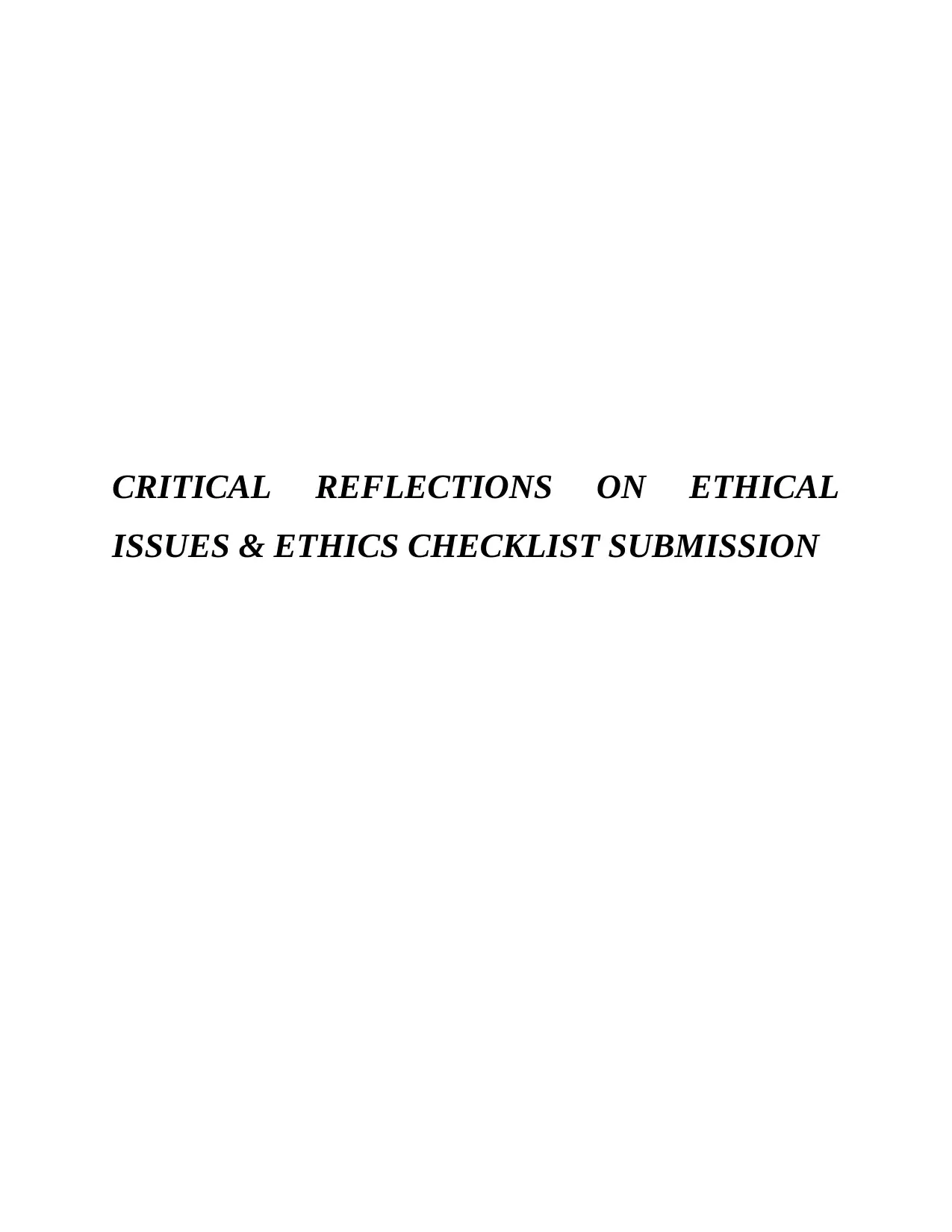
CRITICAL REFLECTIONS ON ETHICAL
ISSUES & ETHICS CHECKLIST SUBMISSION
ISSUES & ETHICS CHECKLIST SUBMISSION
Paraphrase This Document
Need a fresh take? Get an instant paraphrase of this document with our AI Paraphraser
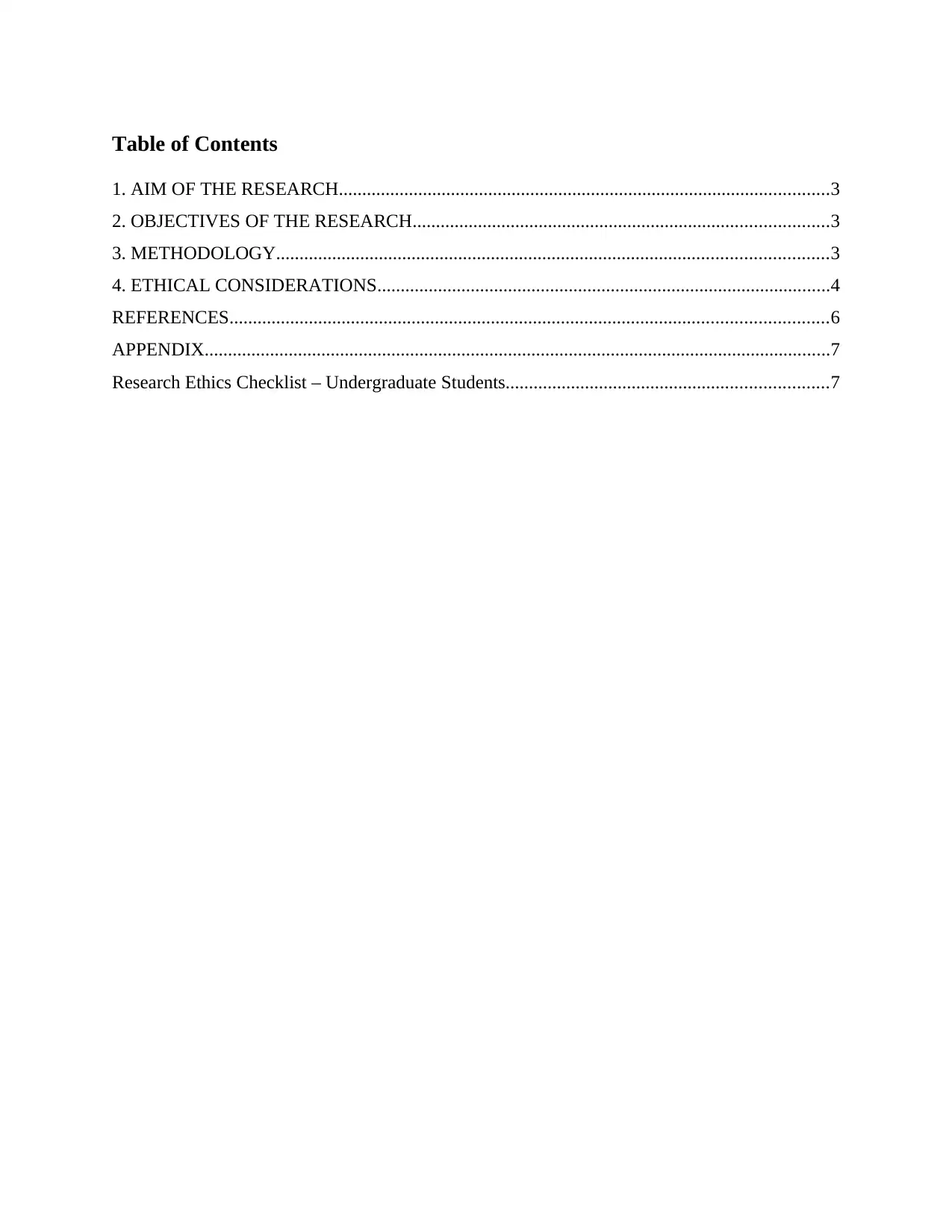
Table of Contents
1. AIM OF THE RESEARCH.........................................................................................................3
2. OBJECTIVES OF THE RESEARCH.........................................................................................3
3. METHODOLOGY......................................................................................................................3
4. ETHICAL CONSIDERATIONS.................................................................................................4
REFERENCES................................................................................................................................6
APPENDIX......................................................................................................................................7
Research Ethics Checklist – Undergraduate Students.....................................................................7
1. AIM OF THE RESEARCH.........................................................................................................3
2. OBJECTIVES OF THE RESEARCH.........................................................................................3
3. METHODOLOGY......................................................................................................................3
4. ETHICAL CONSIDERATIONS.................................................................................................4
REFERENCES................................................................................................................................6
APPENDIX......................................................................................................................................7
Research Ethics Checklist – Undergraduate Students.....................................................................7
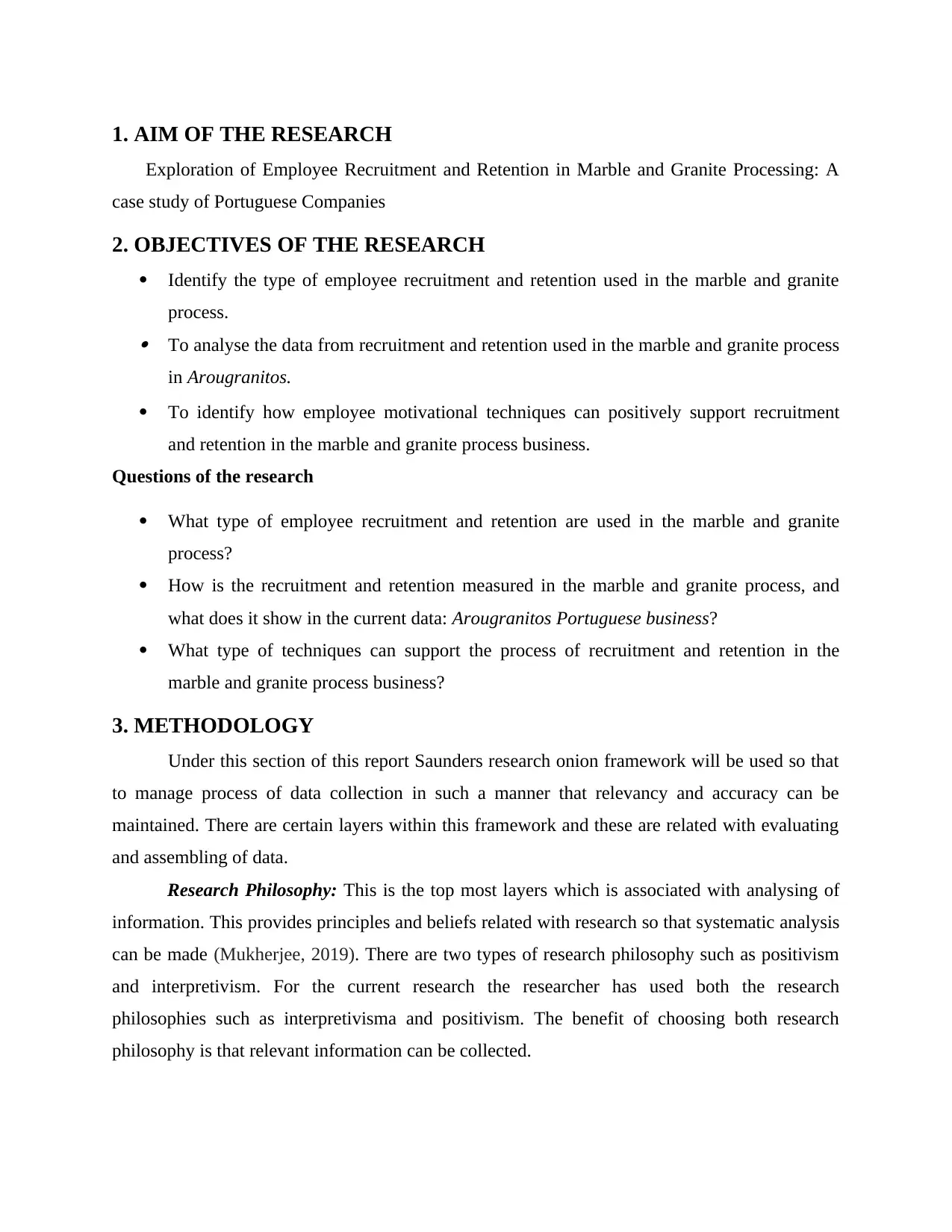
1. AIM OF THE RESEARCH
Exploration of Employee Recruitment and Retention in Marble and Granite Processing: A
case study of Portuguese Companies
2. OBJECTIVES OF THE RESEARCH
Identify the type of employee recruitment and retention used in the marble and granite
process. To analyse the data from recruitment and retention used in the marble and granite process
in Arougranitos.
To identify how employee motivational techniques can positively support recruitment
and retention in the marble and granite process business.
Questions of the research
What type of employee recruitment and retention are used in the marble and granite
process?
How is the recruitment and retention measured in the marble and granite process, and
what does it show in the current data: Arougranitos Portuguese business?
What type of techniques can support the process of recruitment and retention in the
marble and granite process business?
3. METHODOLOGY
Under this section of this report Saunders research onion framework will be used so that
to manage process of data collection in such a manner that relevancy and accuracy can be
maintained. There are certain layers within this framework and these are related with evaluating
and assembling of data.
Research Philosophy: This is the top most layers which is associated with analysing of
information. This provides principles and beliefs related with research so that systematic analysis
can be made (Mukherjee, 2019). There are two types of research philosophy such as positivism
and interpretivism. For the current research the researcher has used both the research
philosophies such as interpretivisma and positivism. The benefit of choosing both research
philosophy is that relevant information can be collected.
Exploration of Employee Recruitment and Retention in Marble and Granite Processing: A
case study of Portuguese Companies
2. OBJECTIVES OF THE RESEARCH
Identify the type of employee recruitment and retention used in the marble and granite
process. To analyse the data from recruitment and retention used in the marble and granite process
in Arougranitos.
To identify how employee motivational techniques can positively support recruitment
and retention in the marble and granite process business.
Questions of the research
What type of employee recruitment and retention are used in the marble and granite
process?
How is the recruitment and retention measured in the marble and granite process, and
what does it show in the current data: Arougranitos Portuguese business?
What type of techniques can support the process of recruitment and retention in the
marble and granite process business?
3. METHODOLOGY
Under this section of this report Saunders research onion framework will be used so that
to manage process of data collection in such a manner that relevancy and accuracy can be
maintained. There are certain layers within this framework and these are related with evaluating
and assembling of data.
Research Philosophy: This is the top most layers which is associated with analysing of
information. This provides principles and beliefs related with research so that systematic analysis
can be made (Mukherjee, 2019). There are two types of research philosophy such as positivism
and interpretivism. For the current research the researcher has used both the research
philosophies such as interpretivisma and positivism. The benefit of choosing both research
philosophy is that relevant information can be collected.
⊘ This is a preview!⊘
Do you want full access?
Subscribe today to unlock all pages.

Trusted by 1+ million students worldwide
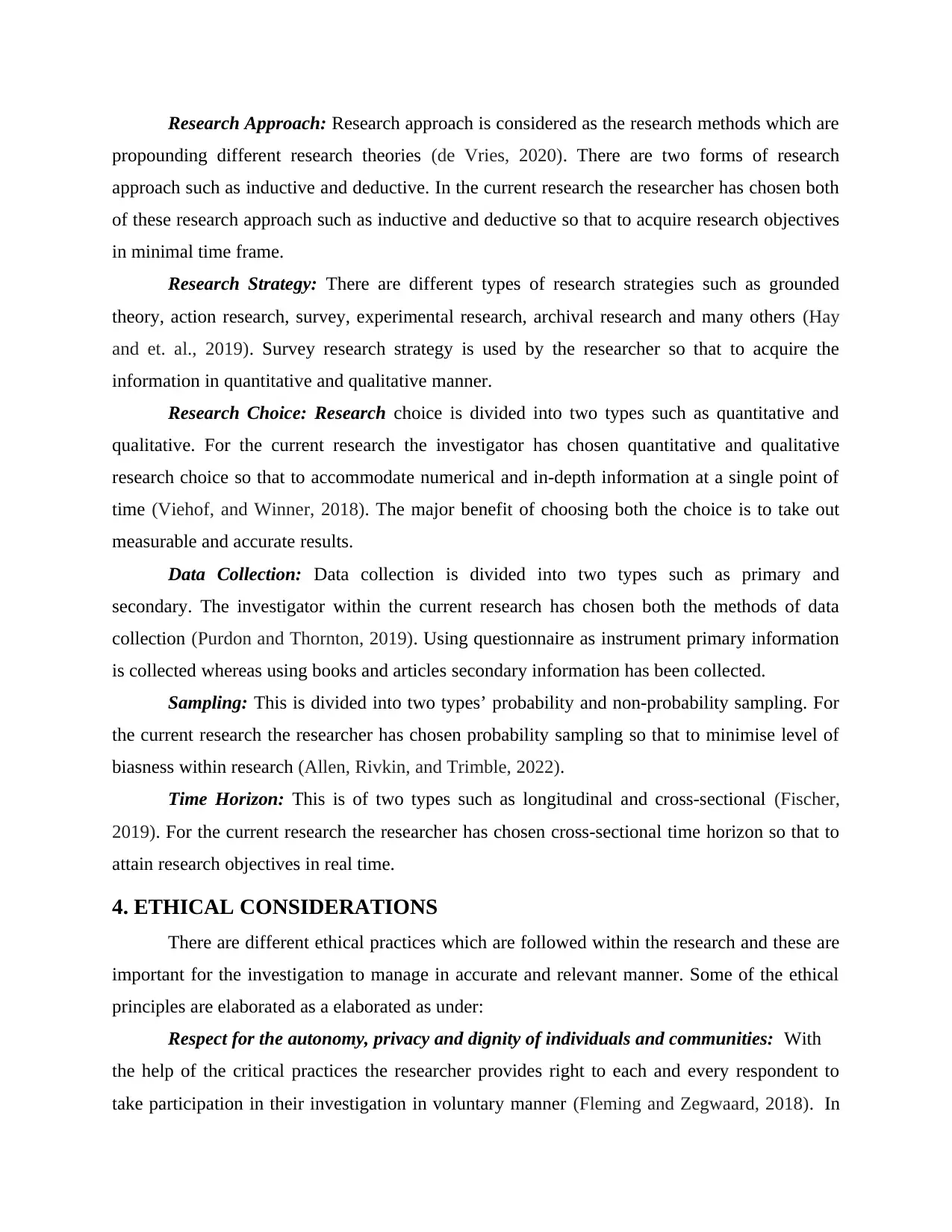
Research Approach: Research approach is considered as the research methods which are
propounding different research theories (de Vries, 2020). There are two forms of research
approach such as inductive and deductive. In the current research the researcher has chosen both
of these research approach such as inductive and deductive so that to acquire research objectives
in minimal time frame.
Research Strategy: There are different types of research strategies such as grounded
theory, action research, survey, experimental research, archival research and many others (Hay
and et. al., 2019). Survey research strategy is used by the researcher so that to acquire the
information in quantitative and qualitative manner.
Research Choice: Research choice is divided into two types such as quantitative and
qualitative. For the current research the investigator has chosen quantitative and qualitative
research choice so that to accommodate numerical and in-depth information at a single point of
time (Viehof, and Winner, 2018). The major benefit of choosing both the choice is to take out
measurable and accurate results.
Data Collection: Data collection is divided into two types such as primary and
secondary. The investigator within the current research has chosen both the methods of data
collection (Purdon and Thornton, 2019). Using questionnaire as instrument primary information
is collected whereas using books and articles secondary information has been collected.
Sampling: This is divided into two types’ probability and non-probability sampling. For
the current research the researcher has chosen probability sampling so that to minimise level of
biasness within research (Allen, Rivkin, and Trimble, 2022).
Time Horizon: This is of two types such as longitudinal and cross-sectional (Fischer,
2019). For the current research the researcher has chosen cross-sectional time horizon so that to
attain research objectives in real time.
4. ETHICAL CONSIDERATIONS
There are different ethical practices which are followed within the research and these are
important for the investigation to manage in accurate and relevant manner. Some of the ethical
principles are elaborated as a elaborated as under:
Respect for the autonomy, privacy and dignity of individuals and communities: With
the help of the critical practices the researcher provides right to each and every respondent to
take participation in their investigation in voluntary manner (Fleming and Zegwaard, 2018). In
propounding different research theories (de Vries, 2020). There are two forms of research
approach such as inductive and deductive. In the current research the researcher has chosen both
of these research approach such as inductive and deductive so that to acquire research objectives
in minimal time frame.
Research Strategy: There are different types of research strategies such as grounded
theory, action research, survey, experimental research, archival research and many others (Hay
and et. al., 2019). Survey research strategy is used by the researcher so that to acquire the
information in quantitative and qualitative manner.
Research Choice: Research choice is divided into two types such as quantitative and
qualitative. For the current research the investigator has chosen quantitative and qualitative
research choice so that to accommodate numerical and in-depth information at a single point of
time (Viehof, and Winner, 2018). The major benefit of choosing both the choice is to take out
measurable and accurate results.
Data Collection: Data collection is divided into two types such as primary and
secondary. The investigator within the current research has chosen both the methods of data
collection (Purdon and Thornton, 2019). Using questionnaire as instrument primary information
is collected whereas using books and articles secondary information has been collected.
Sampling: This is divided into two types’ probability and non-probability sampling. For
the current research the researcher has chosen probability sampling so that to minimise level of
biasness within research (Allen, Rivkin, and Trimble, 2022).
Time Horizon: This is of two types such as longitudinal and cross-sectional (Fischer,
2019). For the current research the researcher has chosen cross-sectional time horizon so that to
attain research objectives in real time.
4. ETHICAL CONSIDERATIONS
There are different ethical practices which are followed within the research and these are
important for the investigation to manage in accurate and relevant manner. Some of the ethical
principles are elaborated as a elaborated as under:
Respect for the autonomy, privacy and dignity of individuals and communities: With
the help of the critical practices the researcher provides right to each and every respondent to
take participation in their investigation in voluntary manner (Fleming and Zegwaard, 2018). In
Paraphrase This Document
Need a fresh take? Get an instant paraphrase of this document with our AI Paraphraser
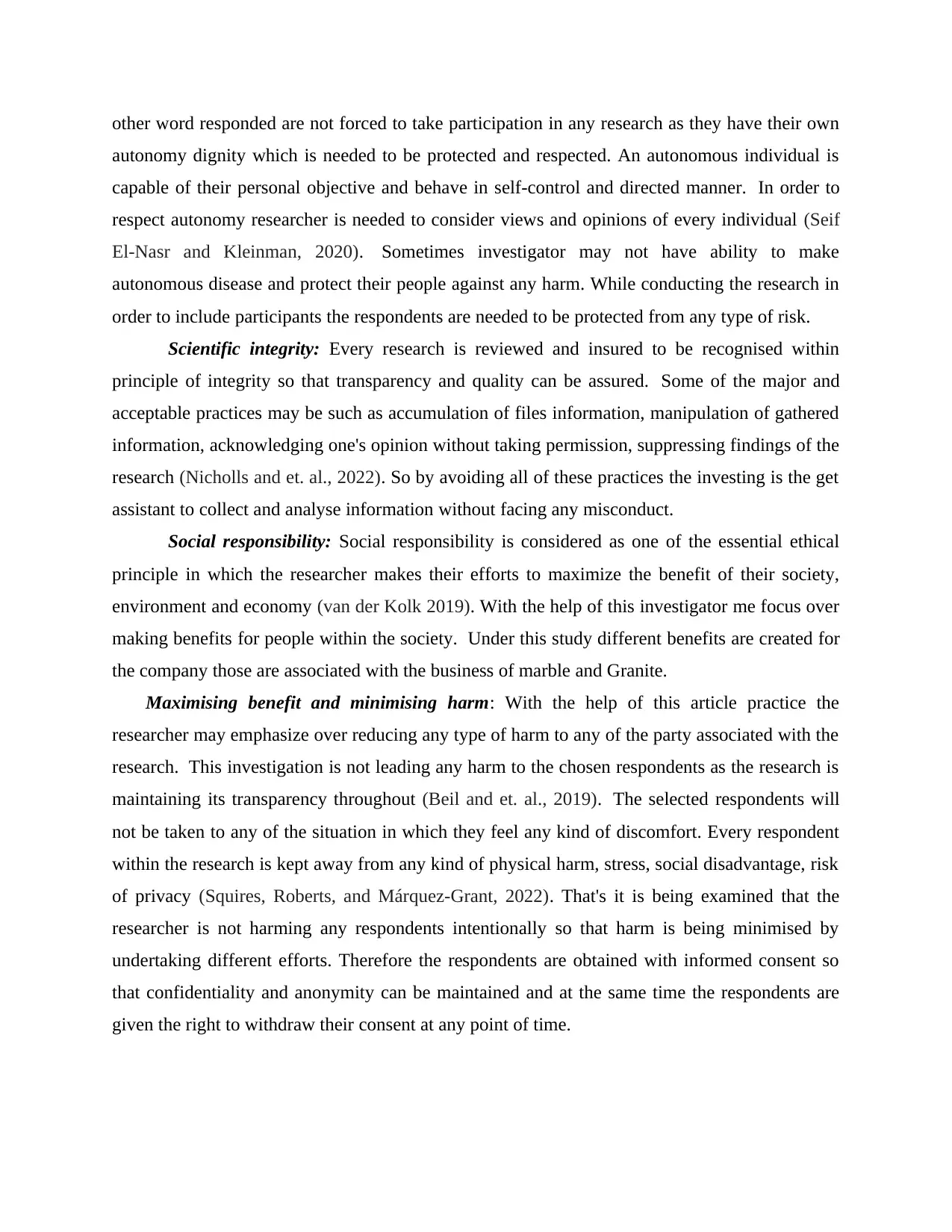
other word responded are not forced to take participation in any research as they have their own
autonomy dignity which is needed to be protected and respected. An autonomous individual is
capable of their personal objective and behave in self-control and directed manner. In order to
respect autonomy researcher is needed to consider views and opinions of every individual (Seif
El-Nasr and Kleinman, 2020). Sometimes investigator may not have ability to make
autonomous disease and protect their people against any harm. While conducting the research in
order to include participants the respondents are needed to be protected from any type of risk.
Scientific integrity: Every research is reviewed and insured to be recognised within
principle of integrity so that transparency and quality can be assured. Some of the major and
acceptable practices may be such as accumulation of files information, manipulation of gathered
information, acknowledging one's opinion without taking permission, suppressing findings of the
research (Nicholls and et. al., 2022). So by avoiding all of these practices the investing is the get
assistant to collect and analyse information without facing any misconduct.
Social responsibility: Social responsibility is considered as one of the essential ethical
principle in which the researcher makes their efforts to maximize the benefit of their society,
environment and economy (van der Kolk 2019). With the help of this investigator me focus over
making benefits for people within the society. Under this study different benefits are created for
the company those are associated with the business of marble and Granite.
Maximising benefit and minimising harm: With the help of this article practice the
researcher may emphasize over reducing any type of harm to any of the party associated with the
research. This investigation is not leading any harm to the chosen respondents as the research is
maintaining its transparency throughout (Beil and et. al., 2019). The selected respondents will
not be taken to any of the situation in which they feel any kind of discomfort. Every respondent
within the research is kept away from any kind of physical harm, stress, social disadvantage, risk
of privacy (Squires, Roberts, and Márquez-Grant, 2022). That's it is being examined that the
researcher is not harming any respondents intentionally so that harm is being minimised by
undertaking different efforts. Therefore the respondents are obtained with informed consent so
that confidentiality and anonymity can be maintained and at the same time the respondents are
given the right to withdraw their consent at any point of time.
autonomy dignity which is needed to be protected and respected. An autonomous individual is
capable of their personal objective and behave in self-control and directed manner. In order to
respect autonomy researcher is needed to consider views and opinions of every individual (Seif
El-Nasr and Kleinman, 2020). Sometimes investigator may not have ability to make
autonomous disease and protect their people against any harm. While conducting the research in
order to include participants the respondents are needed to be protected from any type of risk.
Scientific integrity: Every research is reviewed and insured to be recognised within
principle of integrity so that transparency and quality can be assured. Some of the major and
acceptable practices may be such as accumulation of files information, manipulation of gathered
information, acknowledging one's opinion without taking permission, suppressing findings of the
research (Nicholls and et. al., 2022). So by avoiding all of these practices the investing is the get
assistant to collect and analyse information without facing any misconduct.
Social responsibility: Social responsibility is considered as one of the essential ethical
principle in which the researcher makes their efforts to maximize the benefit of their society,
environment and economy (van der Kolk 2019). With the help of this investigator me focus over
making benefits for people within the society. Under this study different benefits are created for
the company those are associated with the business of marble and Granite.
Maximising benefit and minimising harm: With the help of this article practice the
researcher may emphasize over reducing any type of harm to any of the party associated with the
research. This investigation is not leading any harm to the chosen respondents as the research is
maintaining its transparency throughout (Beil and et. al., 2019). The selected respondents will
not be taken to any of the situation in which they feel any kind of discomfort. Every respondent
within the research is kept away from any kind of physical harm, stress, social disadvantage, risk
of privacy (Squires, Roberts, and Márquez-Grant, 2022). That's it is being examined that the
researcher is not harming any respondents intentionally so that harm is being minimised by
undertaking different efforts. Therefore the respondents are obtained with informed consent so
that confidentiality and anonymity can be maintained and at the same time the respondents are
given the right to withdraw their consent at any point of time.
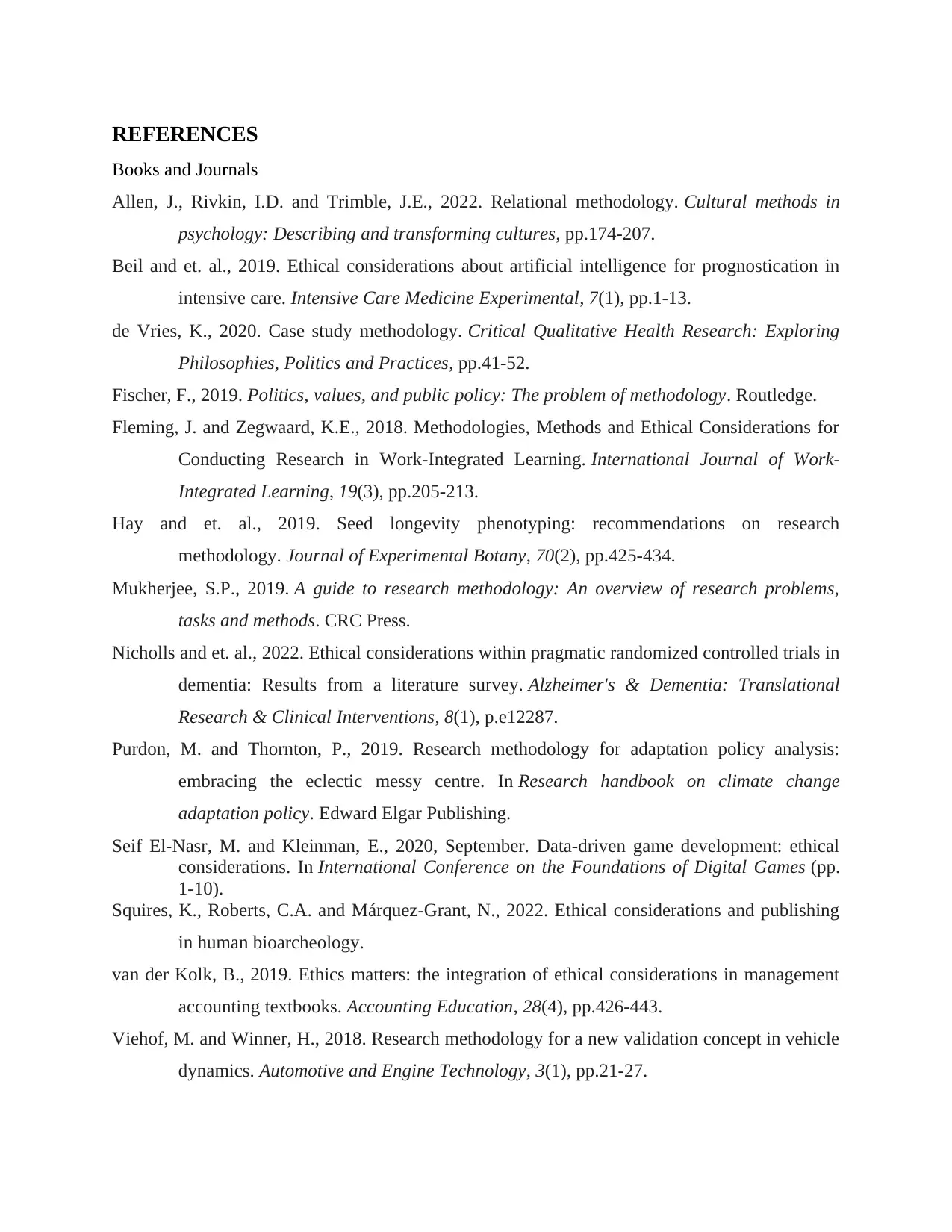
REFERENCES
Books and Journals
Allen, J., Rivkin, I.D. and Trimble, J.E., 2022. Relational methodology. Cultural methods in
psychology: Describing and transforming cultures, pp.174-207.
Beil and et. al., 2019. Ethical considerations about artificial intelligence for prognostication in
intensive care. Intensive Care Medicine Experimental, 7(1), pp.1-13.
de Vries, K., 2020. Case study methodology. Critical Qualitative Health Research: Exploring
Philosophies, Politics and Practices, pp.41-52.
Fischer, F., 2019. Politics, values, and public policy: The problem of methodology. Routledge.
Fleming, J. and Zegwaard, K.E., 2018. Methodologies, Methods and Ethical Considerations for
Conducting Research in Work-Integrated Learning. International Journal of Work-
Integrated Learning, 19(3), pp.205-213.
Hay and et. al., 2019. Seed longevity phenotyping: recommendations on research
methodology. Journal of Experimental Botany, 70(2), pp.425-434.
Mukherjee, S.P., 2019. A guide to research methodology: An overview of research problems,
tasks and methods. CRC Press.
Nicholls and et. al., 2022. Ethical considerations within pragmatic randomized controlled trials in
dementia: Results from a literature survey. Alzheimer's & Dementia: Translational
Research & Clinical Interventions, 8(1), p.e12287.
Purdon, M. and Thornton, P., 2019. Research methodology for adaptation policy analysis:
embracing the eclectic messy centre. In Research handbook on climate change
adaptation policy. Edward Elgar Publishing.
Seif El-Nasr, M. and Kleinman, E., 2020, September. Data-driven game development: ethical
considerations. In International Conference on the Foundations of Digital Games (pp.
1-10).
Squires, K., Roberts, C.A. and Márquez-Grant, N., 2022. Ethical considerations and publishing
in human bioarcheology.
van der Kolk, B., 2019. Ethics matters: the integration of ethical considerations in management
accounting textbooks. Accounting Education, 28(4), pp.426-443.
Viehof, M. and Winner, H., 2018. Research methodology for a new validation concept in vehicle
dynamics. Automotive and Engine Technology, 3(1), pp.21-27.
Books and Journals
Allen, J., Rivkin, I.D. and Trimble, J.E., 2022. Relational methodology. Cultural methods in
psychology: Describing and transforming cultures, pp.174-207.
Beil and et. al., 2019. Ethical considerations about artificial intelligence for prognostication in
intensive care. Intensive Care Medicine Experimental, 7(1), pp.1-13.
de Vries, K., 2020. Case study methodology. Critical Qualitative Health Research: Exploring
Philosophies, Politics and Practices, pp.41-52.
Fischer, F., 2019. Politics, values, and public policy: The problem of methodology. Routledge.
Fleming, J. and Zegwaard, K.E., 2018. Methodologies, Methods and Ethical Considerations for
Conducting Research in Work-Integrated Learning. International Journal of Work-
Integrated Learning, 19(3), pp.205-213.
Hay and et. al., 2019. Seed longevity phenotyping: recommendations on research
methodology. Journal of Experimental Botany, 70(2), pp.425-434.
Mukherjee, S.P., 2019. A guide to research methodology: An overview of research problems,
tasks and methods. CRC Press.
Nicholls and et. al., 2022. Ethical considerations within pragmatic randomized controlled trials in
dementia: Results from a literature survey. Alzheimer's & Dementia: Translational
Research & Clinical Interventions, 8(1), p.e12287.
Purdon, M. and Thornton, P., 2019. Research methodology for adaptation policy analysis:
embracing the eclectic messy centre. In Research handbook on climate change
adaptation policy. Edward Elgar Publishing.
Seif El-Nasr, M. and Kleinman, E., 2020, September. Data-driven game development: ethical
considerations. In International Conference on the Foundations of Digital Games (pp.
1-10).
Squires, K., Roberts, C.A. and Márquez-Grant, N., 2022. Ethical considerations and publishing
in human bioarcheology.
van der Kolk, B., 2019. Ethics matters: the integration of ethical considerations in management
accounting textbooks. Accounting Education, 28(4), pp.426-443.
Viehof, M. and Winner, H., 2018. Research methodology for a new validation concept in vehicle
dynamics. Automotive and Engine Technology, 3(1), pp.21-27.
⊘ This is a preview!⊘
Do you want full access?
Subscribe today to unlock all pages.

Trusted by 1+ million students worldwide
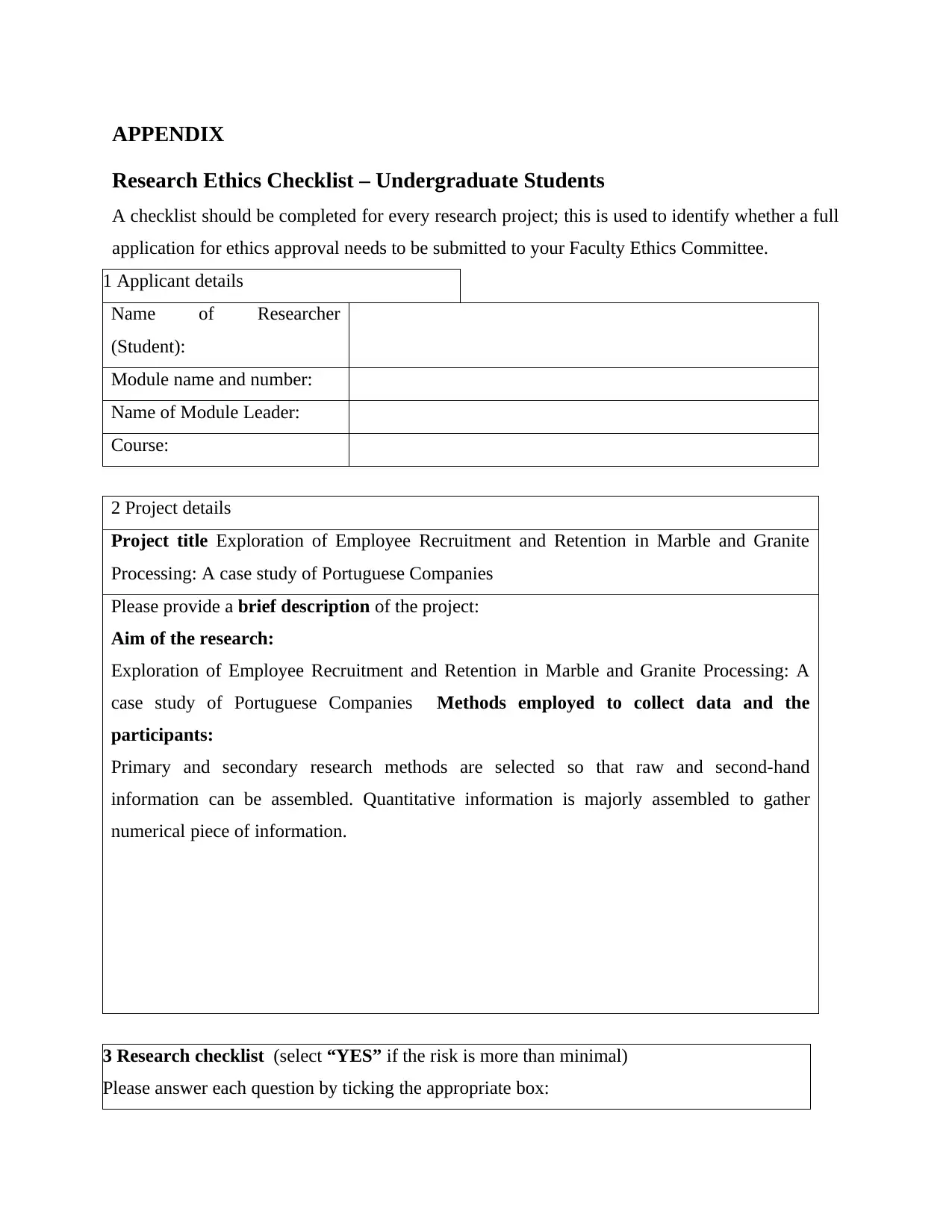
APPENDIX
Research Ethics Checklist – Undergraduate Students
A checklist should be completed for every research project; this is used to identify whether a full
application for ethics approval needs to be submitted to your Faculty Ethics Committee.
1 Applicant details
Name of Researcher
(Student):
Module name and number:
Name of Module Leader:
Course:
2 Project details
Project title Exploration of Employee Recruitment and Retention in Marble and Granite
Processing: A case study of Portuguese Companies
Please provide a brief description of the project:
Aim of the research:
Exploration of Employee Recruitment and Retention in Marble and Granite Processing: A
case study of Portuguese Companies Methods employed to collect data and the
participants:
Primary and secondary research methods are selected so that raw and second-hand
information can be assembled. Quantitative information is majorly assembled to gather
numerical piece of information.
3 Research checklist (select “YES” if the risk is more than minimal)
Please answer each question by ticking the appropriate box:
Research Ethics Checklist – Undergraduate Students
A checklist should be completed for every research project; this is used to identify whether a full
application for ethics approval needs to be submitted to your Faculty Ethics Committee.
1 Applicant details
Name of Researcher
(Student):
Module name and number:
Name of Module Leader:
Course:
2 Project details
Project title Exploration of Employee Recruitment and Retention in Marble and Granite
Processing: A case study of Portuguese Companies
Please provide a brief description of the project:
Aim of the research:
Exploration of Employee Recruitment and Retention in Marble and Granite Processing: A
case study of Portuguese Companies Methods employed to collect data and the
participants:
Primary and secondary research methods are selected so that raw and second-hand
information can be assembled. Quantitative information is majorly assembled to gather
numerical piece of information.
3 Research checklist (select “YES” if the risk is more than minimal)
Please answer each question by ticking the appropriate box:
Paraphrase This Document
Need a fresh take? Get an instant paraphrase of this document with our AI Paraphraser
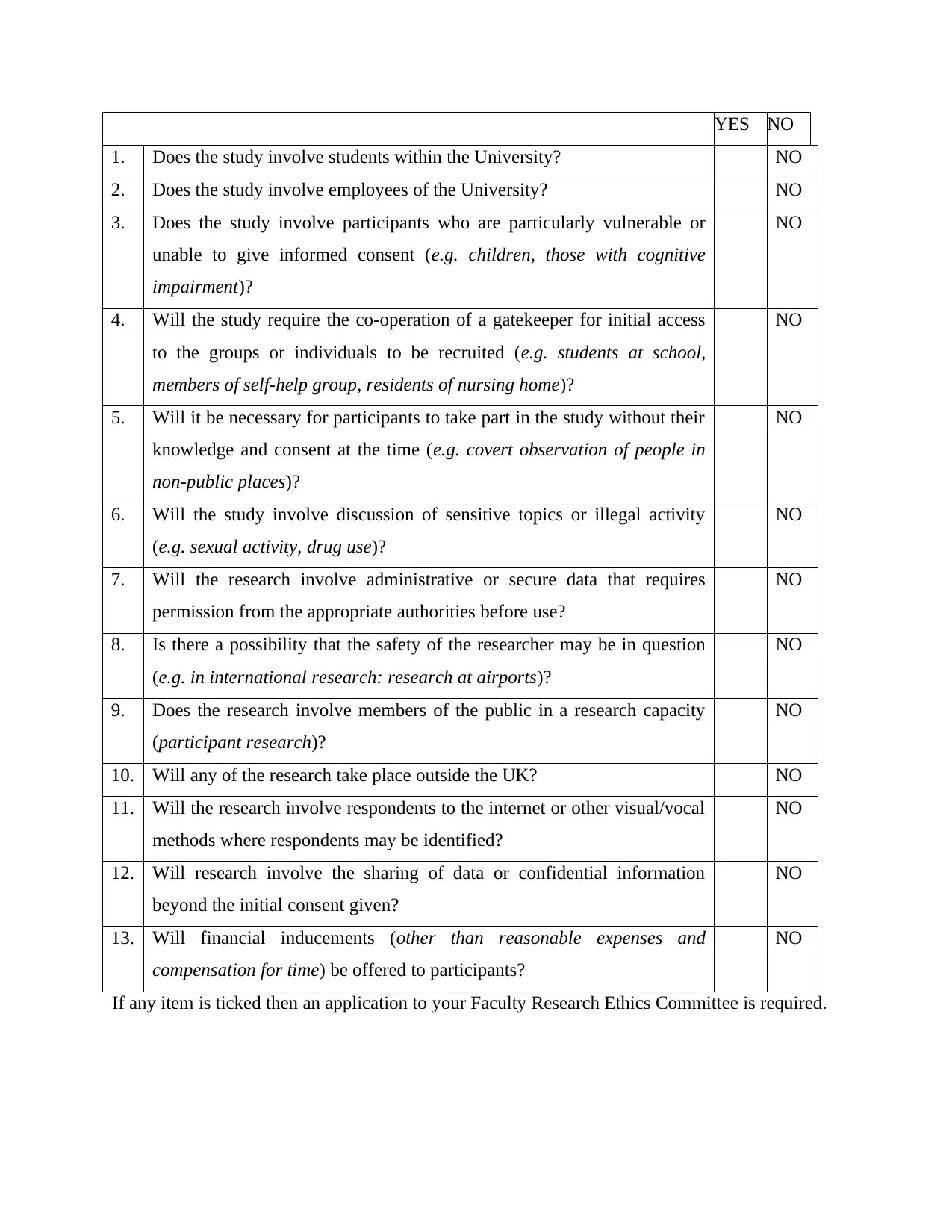
YES NO
1. Does the study involve students within the University? NO
2. Does the study involve employees of the University? NO
3. Does the study involve participants who are particularly vulnerable or
unable to give informed consent (e.g. children, those with cognitive
impairment)?
NO
4. Will the study require the co-operation of a gatekeeper for initial access
to the groups or individuals to be recruited (e.g. students at school,
members of self-help group, residents of nursing home)?
NO
5. Will it be necessary for participants to take part in the study without their
knowledge and consent at the time (e.g. covert observation of people in
non-public places)?
NO
6. Will the study involve discussion of sensitive topics or illegal activity
(e.g. sexual activity, drug use)?
NO
7. Will the research involve administrative or secure data that requires
permission from the appropriate authorities before use?
NO
8. Is there a possibility that the safety of the researcher may be in question
(e.g. in international research: research at airports)?
NO
9. Does the research involve members of the public in a research capacity
(participant research)?
NO
10. Will any of the research take place outside the UK? NO
11. Will the research involve respondents to the internet or other visual/vocal
methods where respondents may be identified?
NO
12. Will research involve the sharing of data or confidential information
beyond the initial consent given?
NO
13. Will financial inducements (other than reasonable expenses and
compensation for time) be offered to participants?
NO
If any item is ticked then an application to your Faculty Research Ethics Committee is required.
1. Does the study involve students within the University? NO
2. Does the study involve employees of the University? NO
3. Does the study involve participants who are particularly vulnerable or
unable to give informed consent (e.g. children, those with cognitive
impairment)?
NO
4. Will the study require the co-operation of a gatekeeper for initial access
to the groups or individuals to be recruited (e.g. students at school,
members of self-help group, residents of nursing home)?
NO
5. Will it be necessary for participants to take part in the study without their
knowledge and consent at the time (e.g. covert observation of people in
non-public places)?
NO
6. Will the study involve discussion of sensitive topics or illegal activity
(e.g. sexual activity, drug use)?
NO
7. Will the research involve administrative or secure data that requires
permission from the appropriate authorities before use?
NO
8. Is there a possibility that the safety of the researcher may be in question
(e.g. in international research: research at airports)?
NO
9. Does the research involve members of the public in a research capacity
(participant research)?
NO
10. Will any of the research take place outside the UK? NO
11. Will the research involve respondents to the internet or other visual/vocal
methods where respondents may be identified?
NO
12. Will research involve the sharing of data or confidential information
beyond the initial consent given?
NO
13. Will financial inducements (other than reasonable expenses and
compensation for time) be offered to participants?
NO
If any item is ticked then an application to your Faculty Research Ethics Committee is required.
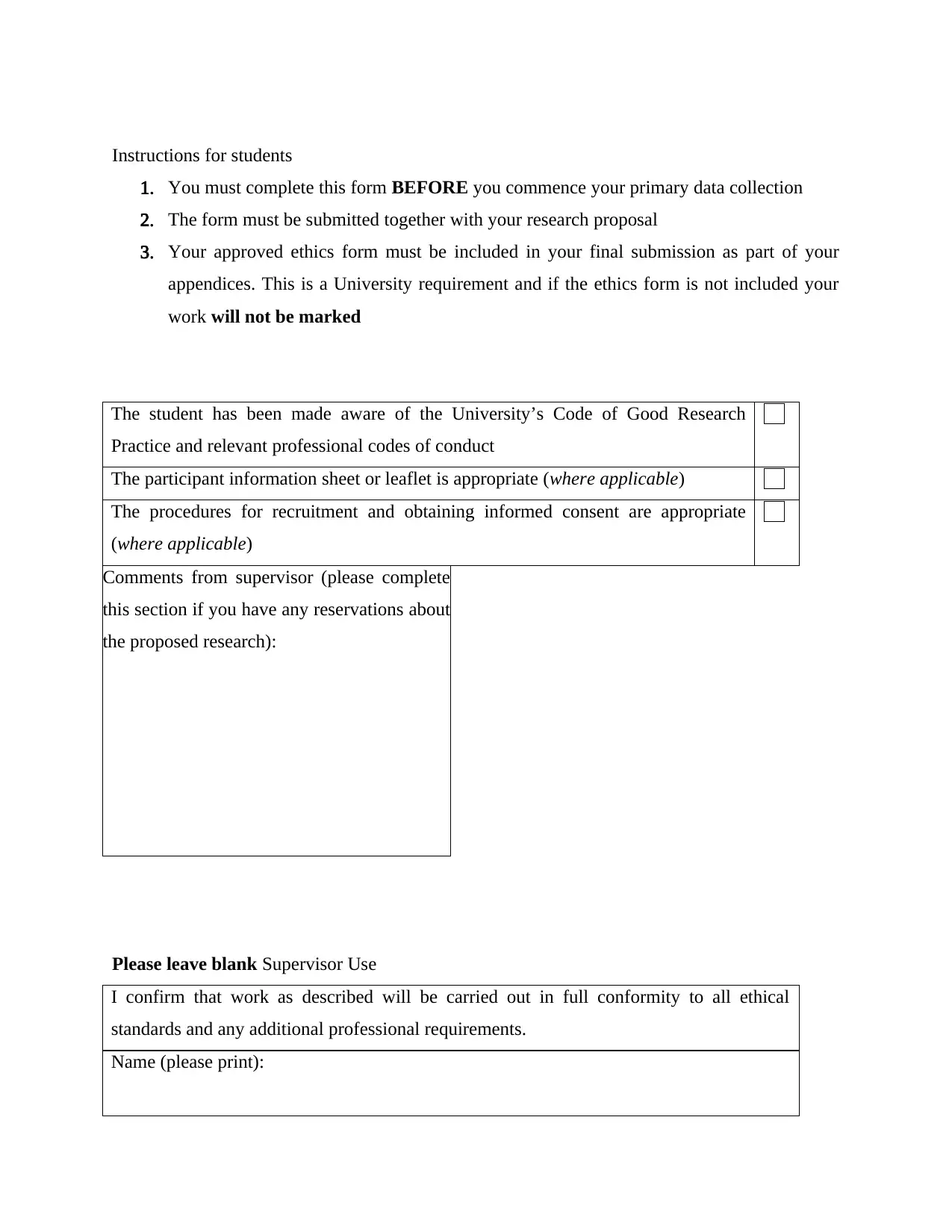
Instructions for students
1. You must complete this form BEFORE you commence your primary data collection
2. The form must be submitted together with your research proposal
3. Your approved ethics form must be included in your final submission as part of your
appendices. This is a University requirement and if the ethics form is not included your
work will not be marked
The student has been made aware of the University’s Code of Good Research
Practice and relevant professional codes of conduct
The participant information sheet or leaflet is appropriate (where applicable)
The procedures for recruitment and obtaining informed consent are appropriate
(where applicable)
Comments from supervisor (please complete
this section if you have any reservations about
the proposed research):
Please leave blank Supervisor Use
I confirm that work as described will be carried out in full conformity to all ethical
standards and any additional professional requirements.
Name (please print):
1. You must complete this form BEFORE you commence your primary data collection
2. The form must be submitted together with your research proposal
3. Your approved ethics form must be included in your final submission as part of your
appendices. This is a University requirement and if the ethics form is not included your
work will not be marked
The student has been made aware of the University’s Code of Good Research
Practice and relevant professional codes of conduct
The participant information sheet or leaflet is appropriate (where applicable)
The procedures for recruitment and obtaining informed consent are appropriate
(where applicable)
Comments from supervisor (please complete
this section if you have any reservations about
the proposed research):
Please leave blank Supervisor Use
I confirm that work as described will be carried out in full conformity to all ethical
standards and any additional professional requirements.
Name (please print):
⊘ This is a preview!⊘
Do you want full access?
Subscribe today to unlock all pages.

Trusted by 1+ million students worldwide
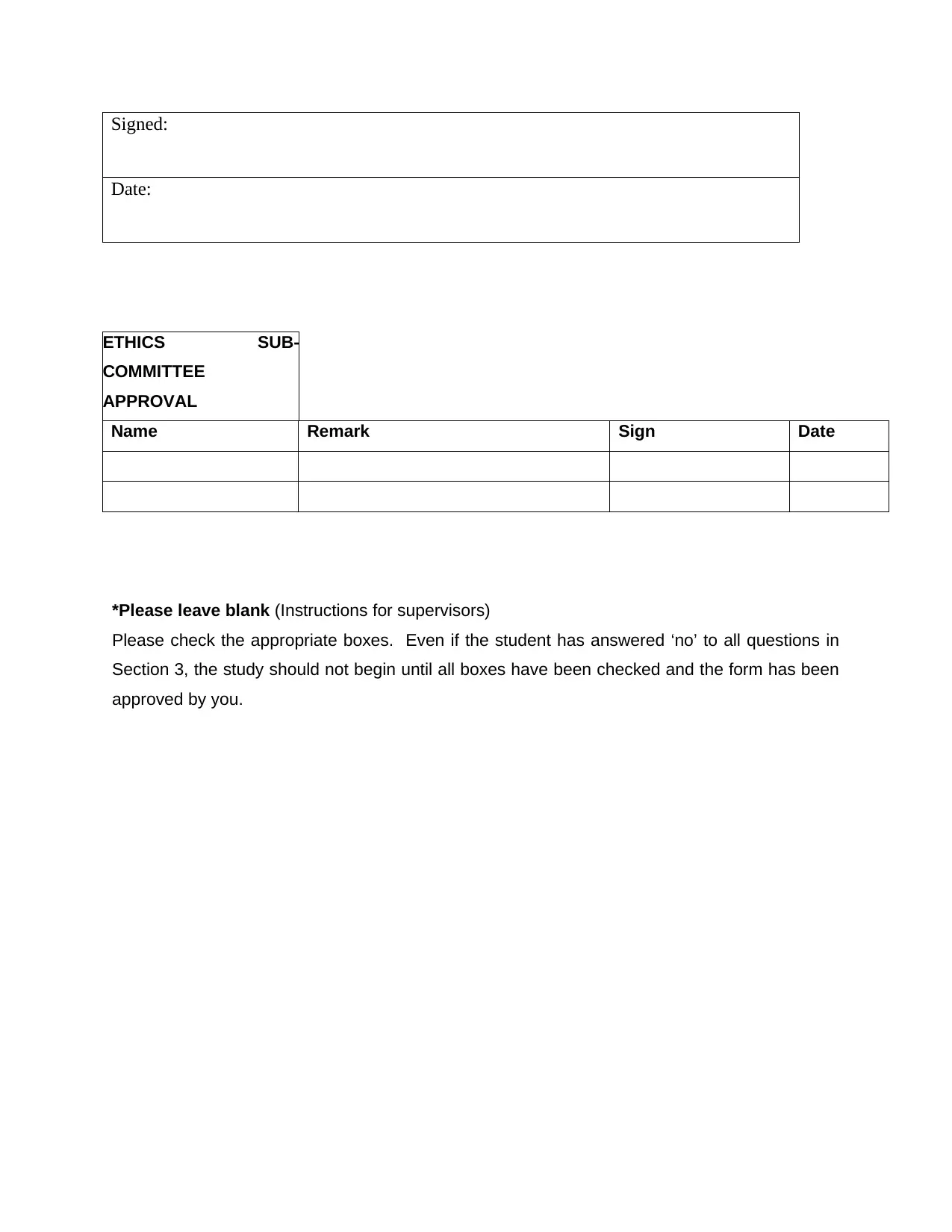
Signed:
Date:
ETHICS SUB-
COMMITTEE
APPROVAL
Name Remark Sign Date
*Please leave blank (Instructions for supervisors)
Please check the appropriate boxes. Even if the student has answered ‘no’ to all questions in
Section 3, the study should not begin until all boxes have been checked and the form has been
approved by you.
Date:
ETHICS SUB-
COMMITTEE
APPROVAL
Name Remark Sign Date
*Please leave blank (Instructions for supervisors)
Please check the appropriate boxes. Even if the student has answered ‘no’ to all questions in
Section 3, the study should not begin until all boxes have been checked and the form has been
approved by you.
1 out of 10
Related Documents
Your All-in-One AI-Powered Toolkit for Academic Success.
+13062052269
info@desklib.com
Available 24*7 on WhatsApp / Email
![[object Object]](/_next/static/media/star-bottom.7253800d.svg)
Unlock your academic potential
Copyright © 2020–2026 A2Z Services. All Rights Reserved. Developed and managed by ZUCOL.





